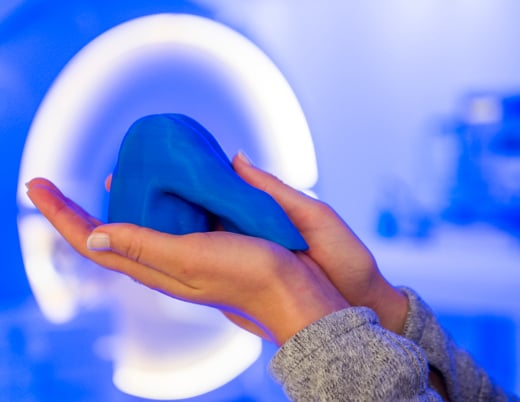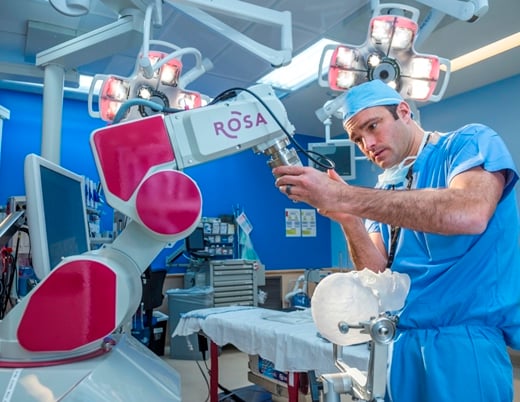How does increased funding allow physician scientists and PhDs to advance research across multiple clinical areas?
So far in 2024, four Children’s Hospital Colorado clinician-scientists received the Research and Innovation Scholar Award (RISA). The award, funded by Children’s Colorado through the Child Health Research Enterprise, was created to support early-career child health investigators who demonstrate outstanding potential for an academic career and impactful research. The total award is $100,000 in direct costs per year for up to two years.
Investments like this play a crucial role in supporting child health investigators as they strive to advance scientific knowledge, translate clinical insights into tested and approved treatment options, advance their careers, secure federal and other external funding, and ultimately improve the well-being of the children under their care.
“We all went into this profession because we want to provide the best possible clinical care that we can for kids. One way we can improve the clinical care that we provide is by gaining knowledge through research,” says Rachel Cafferty, MD, one of this year’s awardees. “Working at a big academic center, we have the ability to learn more through research and then apply what we learn toward providing better clinical care to kids. We have to bolster our research so that we can do better clinically.”
Rachel Cafferty, MD
During her youth in Minnesota, Dr. Cafferty lost a classmate to suicide and noticed the deep reverberations of the tragedy in her community. Years later, she’d become an emergency medicine specialist at Children’s Colorado and saw that the same difficulties kids faced when she was young have been amplified by a global pandemic.
“We're not [mental health specialists], and yet, it's a very common concern in the emergency department (ED). A lot of kids are accessing the ED now for mental and behavioral health concerns,” Dr. Cafferty says. “I want to do better for our patients and for our communities.”
Through her RISA award, Dr. Cafferty is laying the foundations of research that aims to link kids who have visited the ED for mental health needs with resources and outpatient care once they leave. Her first step is to better understand these children and their access to mental health services. To do this, she’s linking records from 13 different EDs across the country to the Childhood Opportunity Index (COI), which looks at factors such as education, crime, pollution, health and more to paint a picture of an individual child’s opportunities and disadvantages.
“Our hypothesis is that the kids who are from very low- or low-opportunity neighborhoods ranked by the COI are going to report that they have not gotten outpatient therapy, they haven't been treated appropriately for their mental health conditions, and are using the ED more,” Dr. Cafferty explains. “I think there's a lot of things we can do to prevent kids having to come to the emergency department. If we can work better with the resources that are available, then hopefully these kids don't need to be in the emergency department at all.”
Melisa Tanverdi, MD
Asthma is one of the most common chronic conditions in children, and according to emergency medicine specialist Melisa Tanverdi, MD, it’s among the most frequent reasons patients seek care in the ED. Providers recommend that these children seek post-ED follow-up care, but according to Dr. Tanverdi, they rarely get it.
“We know that these children often need treatment in the emergency department for asthma attacks, and for some, the ED is the only place asthma care is being delivered,” Dr. Tanverdi explains. “So, our goal is to stay connected after the ED visit to help monitor and manage medications and ultimately allow for optimal outpatient asthma care.”
To begin this work, Dr. Tanverdi is partnering with the Children’s Colorado Breathing Institute. Together, they plan to bridge the gap between emergency and outpatient care to increase asthma medication adherence, improve symptom control and decrease the need for subsequent ED visits. Ultimately, they hope to improve quality of life for children with asthma and their families.
Her RISA-funded research project will enroll patients between 4 and 12 years of age who seek asthma care in the ED in a trial that uses a sensor attached to the patient’s inhaler. This allows the team to monitor symptoms and medication use post-visit to gain insights into how these factors might impact the need for follow-up care. Additionally, with the help of her pulmonary partners, Dr. Tanverdi will connect with each patient at regular intervals to get additional data related to their condition, treatment and symptoms.
“We want to understand better how that recovery time looks. How are kids using their medications in that time period? How are their symptoms during that time period?” she says. “We know they can struggle with asthma symptoms for two to four weeks after, so the post-ED period is an opportunity to really come up with novel and innovative approaches to understand and improve asthma care for children we see in the ED.”
Michelle Clementi, PhD
“The teenagers I work with experience migraine headaches multiple times a week. They’re also often very stressed — always worrying about when the next migraine will come and whether it will disrupt school or social activities,” says pediatric pain psychologist Michelle Clementi, PhD. “Many teens struggle to take the time to slow down and notice how their body feels, which prevents them from intervening early when a migraine begins or is worsening. Mindfulness is one approach that can help teens cultivate emotion regulation and body awareness to help them cope with frequent migraine headaches.”
Over the last year, Dr. Clementi has utilized RISA funding to adapt a research-supported, mindfulness-based telehealth group intervention that has been shown to help adults cope with chronic pain. She plans to design a version of this approach specifically for teens, considering their unique situations and points of view. The first phase of the project, already complete, focused on using interviews with teens, family members and healthcare professionals to learn what they thought might improve a future program’s effectiveness.
“This concept could be really useful for helping teens apply various health tools in the moment to manage migraine and stress. However, teens won’t want to participate in a mindfulness program if it doesn’t speak to them or if they can’t fit a long drive to the hospital into their busy, stressful day,” she says. “I wanted my project to focus on directly incorporating teens’ thoughts and opinions into the program and purposefully using a remotely delivered program to reach as many patients as possible.”
Phase two of the project is now underway. Dr. Clementi and her team are analyzing key findings from the interviews and incorporating them into the design of a new, teen-centered mindfulness program that they hope to begin testing in spring 2024.
Jane Stremming, MD
Neonatal and perinatal specialist Jane Stremming, MD, loves taking care of babies in the neonatal intensive care unit, but the experience has opened her eyes to a difficult reality: Up to 10% of pregnancies are affected by fetal growth restriction, a condition that often leads to complications, including premature birth, perinatal morbidities and even stillbirth. Inspired by the belief that a deeper understanding of fetal growth restriction could lead to new treatments, Dr. Stremming has focused her research on learning more.
“I am particularly interested in the developmental origins of health and disease, the hypothesis that exposures in early life, including during fetal life, can predispose individuals to developing diseases in adulthood,” she explains. “For example, babies with fetal growth restriction have an increased risk for developing metabolic diseases in adulthood, such as Type 2 diabetes. I hope that my research will not only help to improve health outcomes in the perinatal period but will also improve lifelong health.”
Dr. Stremming’s RISA-funded work began in 2023. She used preclinical models to understand how the hormones insulin and insulin-like growth factor-1 (IGF-1) promote fetal growth. Though previous research showed that infusing these hormones individually had a limited impact on fetal growth, Dr. Stremming hypothesized that infusing them together might. That’s exactly what she found: Together, these hormones optimize fetal growth, potentially minimizing the impacts of fetal growth restriction.
Now, she’s working to understand the cellular and molecular mechanisms that make this possible. “Specifically, I am studying how these hormones support cellular growth and differentiation, cellular nutrient uptake and protein synthesis,” Dr. Stremming says.
Featured researchers

Melisa Tanverdi, MD
Pediatrics - Emergency Medicine
Children’s Hospital Colorado
Assistant Professor, Pediatrics – Emergency Medicine/Urgent Care/Network of Care
Pediatrics – Emergency Medicine
University of Colorado School of Medicine

Rachel Cafferty, MD
Pediatrics – Emergency Medicine
Children’s Hospital Colorado
Assistant Professor, Pediatrics – Emergency Medicine
Pediatrics – Emergency Medicine
University of Colorado School of Medicine

Michelle Clementi, PhD
Neuroscience
Children’s Hospital Colorado
Assistant Professor, Psychiatry-Child-CHC
Psychiatry-Child
University of Colorado School of Medicine

Jane Stremming, MD
Neonatologist
Neonatal Intensive Care Unit
Children's Hospital Colorado
Assistant professor
Pediatrics-Neonatology
University of Colorado School of Medicine





 720-777-0123
720-777-0123










